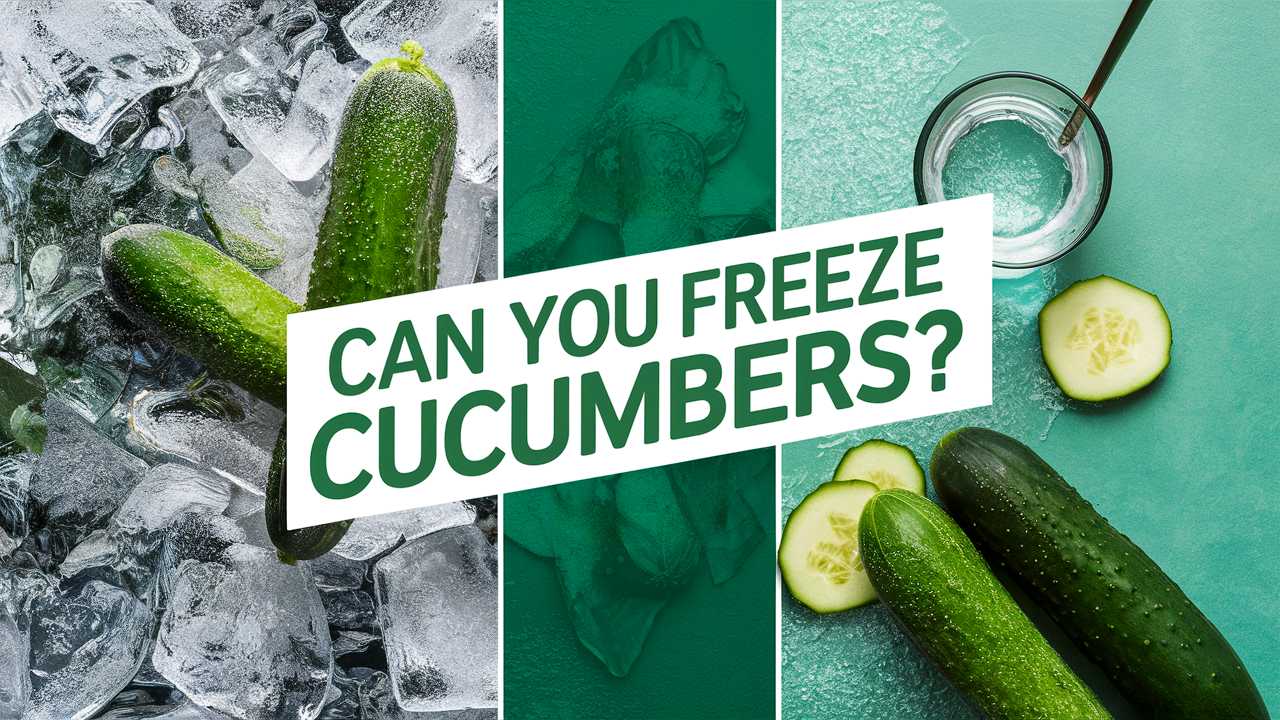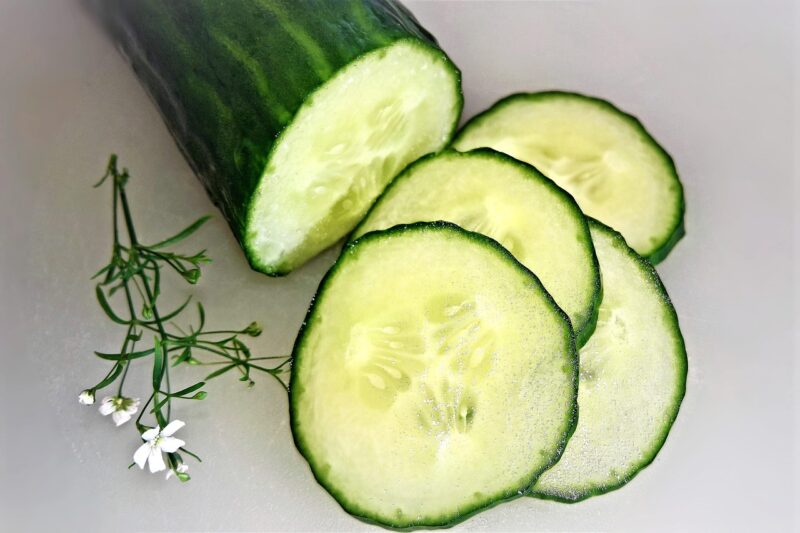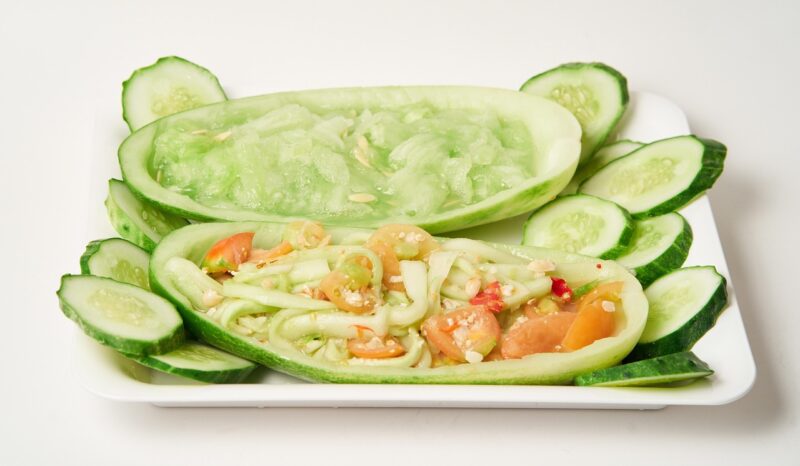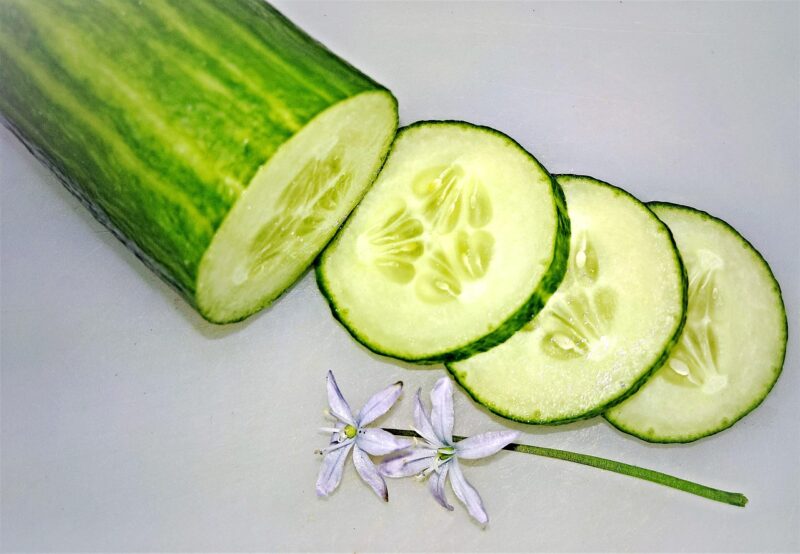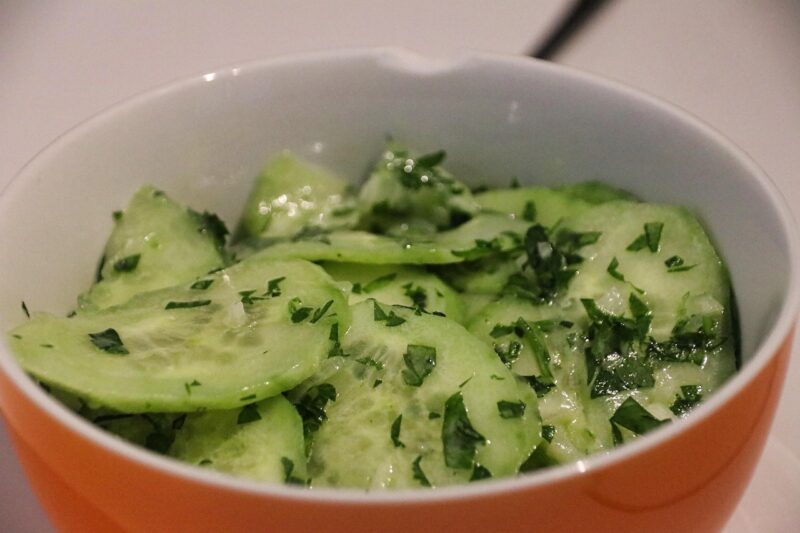In this blog post, we’ll thoroughly explore the nuances of freezing cucumbers. We will look into the science behind freezing produce, discuss the ideal methods for preserving cucumbers, and explore the best ways to use frozen cucumbers once they’ve been thawed. Whether you’re looking to preserve your garden surplus or simply want to enjoy this refreshing vegetable year-round, you’ll find everything you need to know right here.
Understanding Cucumbers and Freezing
Before we get into the practicalities of freezing cucumbers, it’s important to understand what happens to vegetables when they are frozen. Cucumbers are composed of about 95% water, which makes them incredibly hydrating but also affects their texture when frozen.
When most vegetables freeze, water inside their cells forms ice crystals. These ice crystals can rupture cell walls, leading to a mushy texture upon thawing. Cucumbers, due to their high water content, are particularly prone to this phenomenon. While you can freeze cucumbers, the texture may not be ideal for raw consumption afterward. However, frozen cucumbers can still shine in cooked dishes or smoothies where texture isn’t a primary concern.
Can You Freeze Cucumbers?
Yes, you can freeze cucumbers, but with a few considerations. Because of their high water content, it’s crucial to prepare them properly to reduce any undesirable texture changes. Here’s a step-by-step guide on how to effectively freeze cucumbers while maintaining as much quality as possible.
How to Freeze Cucumbers
Choose Fresh Cucumbers: Start with the freshest cucumbers. Look for firm, unblemished cucumbers that are free from soft spots or blemishes. Organic cucumbers are particularly good choices, as they are less likely to be coated in wax.
Wash Thoroughly: Clean your cucumbers under cold running water to remove any dirt or pesticides. It’s best to scrub them gently with a soft brush.
Cut into Desired Size: Depending on how you plan to use your cucumbers later, you can slice them into rounds, spears, or chunks. If you’re making smoothies or soups, thin slices or dices may be preferable.
Blanch Optional: Blanching is a method of briefly boiling vegetables before freezing to preserve flavor and color. For cucumbers, this step is optional but may help retain some crispness. If you choose to blanch, do so for about 1-2 minutes, then plunge them into an ice bath to halt the cooking process.
Dry: Remove excess moisture from the cucumbers using a clean kitchen towel or paper towels. This is vital as excess moisture can lead to ice crystals forming during freezing.
Pack for Freezing: Place your cucumber pieces into freezer bags or airtight containers. Remove as much air as possible to prevent freezer burn. Label them with the date for easy tracking.
Freeze: Place the bags or containers in the freezer, making sure to spread them out so they freeze quickly and evenly.
Practical Tips for Freezing Cucumbers
Avoid Whole Cucumbers: Freezing a whole cucumber can result in an undesirable texture upon thawing. It’s best to cut them before freezing.
Consider Recipes: Think about how you’ll use the frozen cucumbers later. Diced or sliced cucumbers may work better in recipes than whole ones.
Use within a Year: While frozen cucumbers can last longer, it’s best to use them within six months to a year for optimal flavor and texture.
The Science of Freezing Produce
Understanding the science behind freezing cucumbers can help you maximize your results. The freezing process involves lowering the temperature of food to inhibit bacterial growth. As mentioned earlier, when freezing cucumbers, ice crystals form within the vegetable’s cells. While some ice crystals are harmless, larger crystals can damage the cell walls, leading to a mushy texture.
Certain ways can help mitigate these texture changes:
Pack Side by Side: When you place cucumber slices or pieces in the freezer, lay them out flat so they freeze individually. Once fully frozen, you can transfer them to a bag—this prevents clumping.
Preventing Freezer Burn: Exposure to air is a big culprit in freezer burn, which leads to dry, off-flavors in food. Using vacuum-sealed bags or removing as much air as possible will help maintain the quality of your cucumbers.
When to Use Frozen Cucumbers
Once frozen, cucumbers have unique culinary applications. While they may not suit every dish, they can still add value to your meals when used thoughtfully.
Smoothies
Frozen cucumbers make a refreshing addition to smoothies. Their water content helps blend smoothly, and they add a light, refreshing taste. Combine them with fruits like bananas, pineapples, or strawberries for a nutritious treat. For a delicious recipe, try blending frozen cucumbers with Greek yogurt and fresh mint for a cooling summer smoothie.
Soups and Stews
Incorporating thawed cucumbers into soups or stews can be a great way to use them up. The cooking process alleviates textural concerns, allowing them to blend seamlessly with other flavors. Cucumber adds a light, refreshing element to hearty dishes, complementing flavors in a unique way.
Dips and Spreads
Combine thawed, chopped cucumbers into dips like tzatziki or mix them into hummus for added texture and flavor. The yogurt and herbs in spreads can mask any loss of crispness, making them a delightful addition to your appetizers.
Pickling
If you find the texture is less appealing, consider pickling your frozen cucumbers. Pickling not only enhances the flavor but also transforms the texture into something quite enjoyable. You can pickle slices or spears and keep them stored in the refrigerator.
Fresh vs. Frozen Cucumbers: A Comparative Look
While freezing is a convenient preservation method, it’s essential to weigh the pros and cons of fresh versus frozen cucumbers.
Fresh Cucumbers
Crispness: Fresh cucumbers maintain their crunchy texture, making them ideal for salads, sandwiches, and raw snacks.
Flavor: There’s no substitute for the bright, fresh flavor of a raw cucumber. Whether sprinkled with salt or drizzled with olive oil, their taste is unmistakable.
Versatility: Fresh cucumbers can be used in a variety of ways, from salads to garnishes, to main dishes.
Frozen Cucumbers
Convenience: Freezing cucumbers allows you to enjoy them year-round, reducing waste if you have an overabundance.
Cooking Applications: Thawed cucumbers can be used effectively in cooked dishes like soups and casseroles where texture isn’t a concern.
No Seasonality: Enjoying cucumbers out of season can be delightful, and freezing allows you to do just that.
Sifting through these distinctions can help you make an informed decision about when to freeze cucumbers versus using them fresh. Each has its place in culinary adventures.
Creative Ways to Use Frozen Cucumbers
Getting imaginative in the kitchen can lead to some delightful discoveries with frozen cucumbers. Here are some unique ideas for you to try:
Cucumber Sorbet
Blend frozen cucumber chunks with lime juice and a touch of simple syrup for a refreshing sorbet that’s perfect for hot summer days. This can be a fun way to cool down, and the cucumber will provide natural hydrating benefits.
Cucumber Salsa
Use thawed cucumber in a fresh salsa for a twist on the traditional. Dice them finely and mix with tomatoes, onions, jalapeños, lime juice, and cilantro. This refreshing salsa pairs well with grilled meats or as a chip dip.
Cucumber Infused Water
For a hydrating drink, add thawed cucumber slices to your water jug. Although they’ll lose their crunch, they will still provide a refreshing taste. Infusing cucumber in water can make a delightful drink in summer, combining it with other ingredients like mint or berries for added flavor.
Cucumber Salad with a Twist
Incorporate thawed cucumbers into a quirky take on traditional salads. Mix them with chickpeas, feta cheese, red onion, and olives, drizzling with a lemon-olive oil dressing. The cucumbers will add a light crunch and distinct flavor profile, making your salad stand out.
Nutritional Aspects of Cucumbers
Cucumbers are not just a refreshing addition to your meals, but they also come packed with nutrients. Understanding their profile can help you appreciate their role in your diet.
Low in Calories
With their high water content, cucumbers are incredibly low in calories, making them a fantastic choice for those looking to maintain or lose weight. A cup of sliced cucumber packs in just 16 calories.
Hydration
Given their high water content, cucumbers are excellent for hydration. Eating cucumbers can contribute to your daily water intake and keep you feeling refreshed, particularly in warmer weather.
Vitamins and Minerals
Cucumbers contain several important vitamins and minerals, such as vitamin K, vitamin C, potassium, and magnesium. These nutrients play vital roles in blood clotting, immune function, and heart health.
By freezing cucumbers, you ensure they can contribute some of these health benefits even when out of season. While you’re snacking on them in winter, you’ll still be enjoying a nutritious addition to your diet.
Overcoming Common Concerns
Although freezing cucumbers can be beneficial, some concerns often arise. Here’s how to tackle these worries:
Texture Concerns
The most significant hurdle in freezing cucumbers is their texture. While they will not have the same crispness after thawing, using them in cooked dishes or blended drinks can mask these changes. Embrace their new character and experiment with different recipes.
Nutrient Loss
Some people worry that freezing vegetables leads to nutrient loss. While some vitamins can diminish, cucumbers generally retain most of their nutrients when frozen properly. Blanching before freezing can help preserve these even further.
Storage and Shelf Life
Be aware of how long your cucumbers have been frozen. While frozen cucumbers can last for several months to a year, aiming to use them within a few months is best for optimal flavor and quality.
Conclusion
Freezing cucumbers is a practical way to enjoy this versatile vegetable all year round, despite some potential drawbacks. By understanding how to prepare them correctly and knowing how to utilize them, you can effectively preserve their quality and expand your culinary opportunities.
So the next time you’re faced with an abundance of cucumbers from your garden or your local farm stand, remember that freezing is a viable option. Embrace creativity in your kitchen while knowing the nutritional benefits are just as important as enjoying their flavors. Whether through smoothies, soups, or creative salsas, you can savor cucumbers in many ways beyond the summer months.


